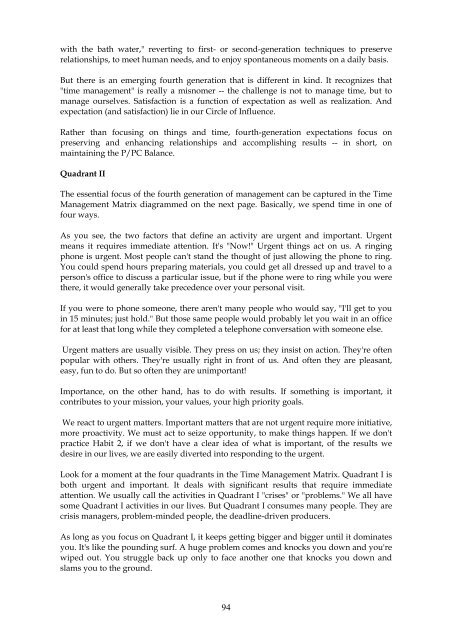Covey - The 7 habits of highly effective people
Create successful ePaper yourself
Turn your PDF publications into a flip-book with our unique Google optimized e-Paper software.
with the bath water," reverting to first- or second-generation techniques to preserve<br />
relationships, to meet human needs, and to enjoy spontaneous moments on a daily basis.<br />
But there is an emerging fourth generation that is different in kind. It recognizes that<br />
"time management" is really a misnomer -- the challenge is not to manage time, but to<br />
manage ourselves. Satisfaction is a function <strong>of</strong> expectation as well as realization. And<br />
expectation (and satisfaction) lie in our Circle <strong>of</strong> Influence.<br />
Rather than focusing on things and time, fourth-generation expectations focus on<br />
preserving and enhancing relationships and accomplishing results -- in short, on<br />
maintaining the P/PC Balance.<br />
Quadrant II<br />
<strong>The</strong> essential focus <strong>of</strong> the fourth generation <strong>of</strong> management can be captured in the Time<br />
Management Matrix diagrammed on the next page. Basically, we spend time in one <strong>of</strong><br />
four ways.<br />
As you see, the two factors that define an activity are urgent and important. Urgent<br />
means it requires immediate attention. It's "Now!" Urgent things act on us. A ringing<br />
phone is urgent. Most <strong>people</strong> can't stand the thought <strong>of</strong> just allowing the phone to ring.<br />
You could spend hours preparing materials, you could get all dressed up and travel to a<br />
person's <strong>of</strong>fice to discuss a particular issue, but if the phone were to ring while you were<br />
there, it would generally take precedence over your personal visit.<br />
If you were to phone someone, there aren't many <strong>people</strong> who would say, "I'll get to you<br />
in 15 minutes; just hold." But those same <strong>people</strong> would probably let you wait in an <strong>of</strong>fice<br />
for at least that long while they completed a telephone conversation with someone else.<br />
Urgent matters are usually visible. <strong>The</strong>y press on us; they insist on action. <strong>The</strong>y're <strong>of</strong>ten<br />
popular with others. <strong>The</strong>y're usually right in front <strong>of</strong> us. And <strong>of</strong>ten they are pleasant,<br />
easy, fun to do. But so <strong>of</strong>ten they are unimportant!<br />
Importance, on the other hand, has to do with results. If something is important, it<br />
contributes to your mission, your values, your high priority goals.<br />
We react to urgent matters. Important matters that are not urgent require more initiative,<br />
more proactivity. We must act to seize opportunity, to make things happen. If we don't<br />
practice Habit 2, if we don't have a clear idea <strong>of</strong> what is important, <strong>of</strong> the results we<br />
desire in our lives, we are easily diverted into responding to the urgent.<br />
Look for a moment at the four quadrants in the Time Management Matrix. Quadrant I is<br />
both urgent and important. It deals with significant results that require immediate<br />
attention. We usually call the activities in Quadrant I "crises" or "problems." We all have<br />
some Quadrant I activities in our lives. But Quadrant I consumes many <strong>people</strong>. <strong>The</strong>y are<br />
crisis managers, problem-minded <strong>people</strong>, the deadline-driven producers.<br />
As long as you focus on Quadrant I, it keeps getting bigger and bigger until it dominates<br />
you. It's like the pounding surf. A huge problem comes and knocks you down and you're<br />
wiped out. You struggle back up only to face another one that knocks you down and<br />
slams you to the ground.<br />
94


